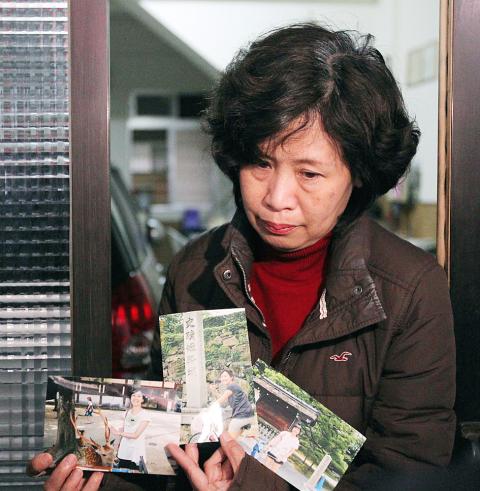Two female Taiwanese students were killed in the dormitory of a Japanese language school in Tokyo yesterday. At present no motive for the murders has been ascertained, a Ministry of Foreign Affairs official said.
Su Qi-cheng (蘇啟誠), deputy secretary-general of the ministry’s Association of East Asian Relations, said the ministry has requested that the police in Japan, who are investigating the incident, keep Taiwanese officials up to date with the latest developments
According to Japanese media -reports, the two students, 23-year-old Lin Chih-ying (林芷瀅) and 25-year-old Julia Chu (朱立婕), were found covered in blood in the bedroom and doorway of a dormitory at the Intercultural Institute of Japan in the Taito area of eastern Tokyo.

Photo: CNA
One of the women died at the scene, the other a short time later after being rushed to hospital. Both had been reportedly stabbed in the neck.
The Japanese media reported that police in Tokyo received a report of the incident at 11am yesterday from two teachers at the Intercultural Institute of Japan, after being informed by two male Taiwanese students that they were unable to contact the women.
A police search of the dormitory failed to turn up keys to the apartment or the murder weapon, according to Japanese media reports, with the police quoted as saying that the women died from knife wounds to the carotid artery from which they bled to death.
Ministry of Foreign Affairs spokesperson James Chang (章計平) said Taiwan’s representative office in Tokyo had held an urgent meeting and set up a special task force to handle the case, adding that the ministry would provide all necessary assistance to the -families of the two students.
“An emergency task force has been formed by Taiwan’s representative office in Tokyo to look into the details of the incident,” Chang said. “Our staff has arrived at the scene to collaborate with the local police.”
Members of the victims’ families arrived in the city late yesterday.
Lin’s father told reporters in Greater Taichung yesterday that when he last spoke to his daughter on Wednesday night by Internet phone, she said she was planning to visit Hokkaido in northern Japan the next day. He said it was hard for him to accept that just one day later she had died.
The father added that he believed the women were killed by someone they knew, noting that the dormitory has a security system that requires an electronic security card for entry and exit.
Additional reporting by CNA

Right-wing political scientist Laura Fernandez on Sunday won Costa Rica’s presidential election by a landslide, after promising to crack down on rising violence linked to the cocaine trade. Fernandez’s nearest rival, economist Alvaro Ramos, conceded defeat as results showed the ruling party far exceeding the threshold of 40 percent needed to avoid a runoff. With 94 percent of polling stations counted, the political heir of outgoing Costa Rican President Rodrigo Chaves had captured 48.3 percent of the vote compared with Ramos’ 33.4 percent, the Supreme Electoral Tribunal said. As soon as the first results were announced, members of Fernandez’s Sovereign People’s Party

EMERGING FIELDS: The Chinese president said that the two countries would explore cooperation in green technology, the digital economy and artificial intelligence Chinese President Xi Jinping (習近平) yesterday called for an “equal and orderly multipolar world” in the face of “unilateral bullying,” in an apparent jab at the US. Xi was speaking during talks in Beijing with Uruguayan President Yamandu Orsi, the first South American leader to visit China since US special forces captured then-Venezuelan president Nicolas Maduro last month — an operation that Beijing condemned as a violation of sovereignty. Orsi follows a slew of leaders to have visited China seeking to boost ties with the world’s second-largest economy to hedge against US President Donald Trump’s increasingly unpredictable administration. “The international situation is fraught

MORE RESPONSIBILITY: Draftees would be expected to fight alongside professional soldiers, likely requiring the transformation of some training brigades into combat units The armed forces are to start incorporating new conscripts into combined arms brigades this year to enhance combat readiness, the Executive Yuan’s latest policy report said. The new policy would affect Taiwanese men entering the military for their compulsory service, which was extended to one year under reforms by then-president Tsai Ing-wen (蔡英文) in 2022. The conscripts would be trained to operate machine guns, uncrewed aerial vehicles, anti-tank guided missile launchers and Stinger air defense systems, the report said, adding that the basic training would be lengthened to eight weeks. After basic training, conscripts would be sorted into infantry battalions that would take

GROWING AMBITIONS: The scale and tempo of the operations show that the Strait has become the core theater for China to expand its security interests, the report said Chinese military aircraft incursions around Taiwan have surged nearly 15-fold over the past five years, according to a report released yesterday by the Democratic Progressive Party’s (DPP) Department of China Affairs. Sorties in the Taiwan Strait were previously irregular, totaling 380 in 2020, but have since evolved into routine operations, the report showed. “This demonstrates that the Taiwan Strait has become both the starting point and testing ground for Beijing’s expansionist ambitions,” it said. Driven by military expansionism, China is systematically pursuing actions aimed at altering the regional “status quo,” the department said, adding that Taiwan represents the most critical link in China’s